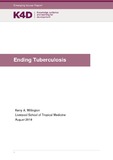| dc.contributor.author | Millington, Kerry A. | |
| dc.date.accessioned | 2018-09-10T13:48:46Z | |
| dc.date.available | 2018-09-10T13:48:46Z | |
| dc.date.issued | 2018-08 | |
| dc.identifier.citation | Millington, K.A. (2018) Ending Tuberculosis, K4D Emerging Issues Report, Brighton: Institute of Development Studies | en |
| dc.identifier.uri | https://opendocs.ids.ac.uk/opendocs/handle/20.500.12413/14054 | |
| dc.description.abstract | This report examines the challenges facing ending tuberculosis (TB). TB is preventable and curable, and yet it continues to affect over 10 million people a year and is the world’s deadliest infectious disease. TB affects those most vulnerable and threatens livelihoods, perpetuating poverty and undermining economic development. The spread of drug-resistant TB, against which we are ill-equipped to respond to, threatens global health security. Current global efforts in tackling TB means that the 2015 Sustainable Development Goal (SDG) Three to end TB by 2030 will not be met for over a century.
Optimising use and implementation of current and new tools emerging from the pipeline in the provision of equitable TB care and prevention within the broader context of universal health coverage (UHC) and social protection can be done now to accelerate progress. New tools will need to be available by 2025 to accelerate progress further but investment needs to happen now to ensure a vaccine, point-of-care diagnostic and new drugs are ready. Partnerships and reaching out to all key populations vulnerable to TB will help to find and treat the four million people with TB missed by the health system each year.
The United Nations General Assembly High Level Meeting (UN HLM) on TB on 26 September 2018 offers a once-in-a-lifetime opportunity for the global TB community led by heads of state and government to prioritise, invest, partner and reach out to all to cure and prevent TB contributing to the good health and well-being of people, eliminating poverty and enabling work and economic growth. Substantial investment will not only deliver a world free of TB but will also strengthen health systems to respond to diseases beyond TB, help move towards UHC, widen social protection and address social and economic determinants of poverty. | en |
| dc.language.iso | en | en |
| dc.publisher | IDS | en |
| dc.relation.ispartofseries | K4D Emerging Issues Report; | |
| dc.rights | This report was prepared for the UK Government’s Department for International Development (DFID) and its partners in support of pro-poor programmes. It is licensed for non-commercial purposes only. K4D cannot be held responsible for errors or any consequences arising from the use of information contained in this report. Any views and opinions expressed do not necessarily reflect those of DFID, K4D or any other contributing organisation. © DFID - Crown copyright 2017. | en |
| dc.rights.uri | https://www.nationalarchives.gov.uk/doc/open-government-licence/version/3/ | en |
| dc.subject | Governance | en |
| dc.subject | Health | en |
| dc.subject | Millennium Development Goals | en |
| dc.title | Ending Tuberculosis | en |
| dc.type | Other | en |
| dc.rights.holder | DFID – Crown Copyright | en |
| dcterms.dateAccepted | 2018-08 | |
| rioxxterms.funder | Department for International Development, UK Government | en |
| rioxxterms.identifier.project | K4D | en |
| rioxxterms.version | VoR | en |
| rioxxterms.funder.project | 238a9fa4-fe4a-4380-996b-995f33607ba0 | en |

